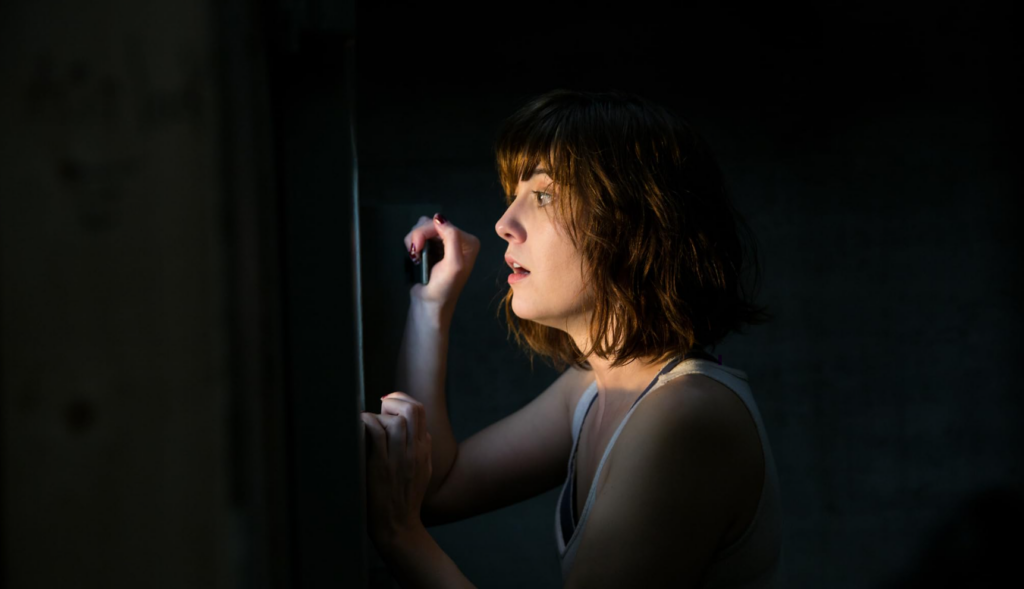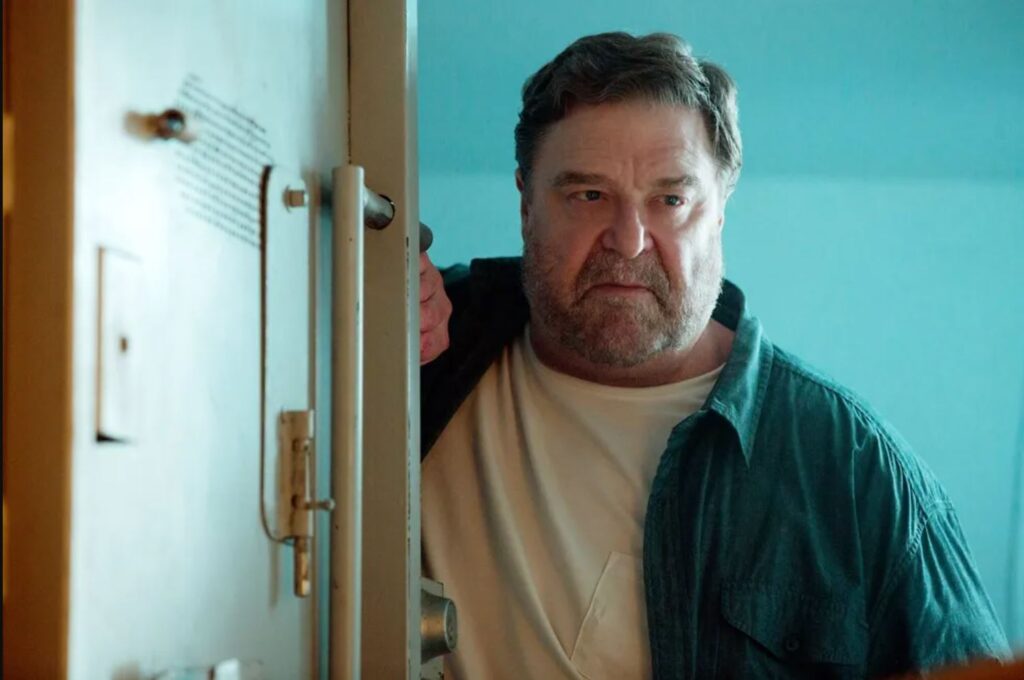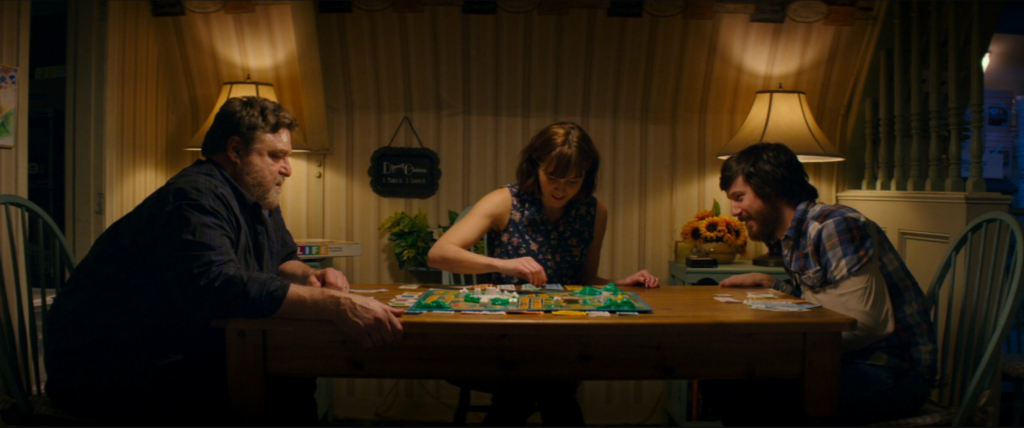| Caitlyn Speier |

10 Cloverfield Lane plays at the Trylon Cinema from Friday, July 5th, through Sunday, July 7th. Visit trylon.org for tickets and more information.
2016, the year I turned 16, Donald Trump was elected President of the United States of America, and more importantly, 10 Cloverfield Lane was released to a nearly unanimous “meh, not terrible” from audiences and critics alike. Everything was perfect and awesome! (Please, please, please, let it be clear that in my experience being 16 and watching Donald Trump be elected President was, in fact, not awesome!) I was all in on 10 Cloverfield Lane being one of my new definitive personal favorites. Specifically, I remember the cuts of silence during the crash in the opening sequence as the first time I’d ever noticed sound editing in a film, thinking John Gallagher Jr. was just about the coolest person alive (this would have been the same year I watched Hush and Short Term 12—undeniable highlights of Gallagher’s filmography), and being desperate to see more of Mary Elizabeth Winstead as Michelle. In retrospect, I completely stand by these takeaways, but I can also see how I was probably mostly taken by the novelty of it all. At the time, I lacked any particular appreciation for the original Cloverfield, which I had not yet seen and honestly didn’t like much when I finally got around to watching it (the camera work made me dizzy and the male characters were… unbearable?). Now that it is 2024, I’m not quite as all in on 10 Cloverfield Lane as one of my favorite movies of all time, but I am just as eager to talk about it.
Much of my time in these last few months has been spent thinking about abuse and control and loss and conspiracy, all of which are lighthearted and fun topics and dominant themes of 10 Cloverfield Lane. These are themes that I feel are often overlooked in popular discourse about this film in favor of dissecting the ‘alien twist’ of it all. So, let’s start there: would 10 Cloverfield Lane have been a better film had there been no threat outside? Oh, and yeah, spoilers for anyone reading who hasn’t seen 10 Cloverfield Lane—there’s an alien at the end!
In one of his more ominous moments, John Goodman’s expertly crafted character, Howard, remarks “Humans are strange creatures, you can’t always convince them that safety is in their best interest.” Protection via isolation is not a new idea but I think it is one that many people are now much more intimately familiar with and potentially, can see many more of the ways that isolation can foster both security and dysfunction. With the hindsight of living in a post-COVID-lockdown world, we can view this movie as a near-prophetic display of the connections between isolation, conspiracy, and abuse.

To be asked to limit yourself in service avoiding a threat perceived by someone else is to be asked to trust their perception of reality over your own. It’s something that’s not inherently damaging and, in many ways, could be reflective of cooperation and the potential for growth or genuine protection. However, issues arise when something occurs to damage that trust (consider: inconsistencies in Howard’s story about his daughter). Inconsistencies drive people to seek explanation and can often veer into conspiracy as there is a lack of knowledge to build from and a motivating force of fear and insecurity (consider: suggestions that Howard has a history of kidnapping women and keeping them hostage in an underground bunker). Along with conspiracy comes mistrust and the question becomes who will remain in control. Often the most damaging parts of abuse are the ways it blurs truth and fiction in service of one person’s perception of reality over another’s, eventually making it challenging to believe and act on your own perception. Michelle makes repeated attempts to leave the bunker, but ultimately, the reason Howard was able to remain in control for as long as he did was because there WAS something else, even more unfamiliar than him that existed outside.
One of the more conceptually challenging features of these dynamics, for me, are the ways they can play out in intimate personal settings as well as on a larger societal level. I wouldn’t go so far as to say 10 Cloverfield Lane is attempting to assert a coherent critique of government overreach and/ or corruption, but I do think the inclusion of John Gallagher Jr.’s character, Emmett, introduces an essential piece to understanding how these dynamics morph when they transition from dialectical to triangular. Dysfunctional dynamics are dysfunctional regardless of the number of people involved, but with the introduction of more people comes more complexity as well as a higher standard for establishing something as being true within a shared reality. Consider how Emmett both helped Howard build trust with Michelle that there is indeed something to fear outside, but was equally essential in unraveling that trust once evidence of his potential previous misconduct was discovered. The loss of Emmett’s character also serves as the emotional turning point in the narrative as it signals to Michelle that it is just as unsafe inside as it is outside.

The wonder of exploring these dynamics in the structure of a borderline blockbuster film is how clearly and objectively they can be laid out, but to me, some of the most compelling elements of the plot of 10 Cloverfield Lane are the more ambiguous ones. The film opens with Michelle driving away from a relationship we only have mere morsels of information about and ends with her driving away from a situation we know significantly more about. To say that this movie would have been better without the last 10 minutes, to me, is missing what this movie is all about. Yes, the world is indeed a big and scary and dangerous place, but that alone does not give anyone the right to lock someone else away, and in all likelihood, one will need to do as much as they can to open themselves up to do anything about it. There’s something in the air now, anyone who’s paying close attention can feel it. It seems many who were hit hard by isolation during the pandemic have come back to life—quietly, but all at once. (And by everyone, I mean at the very least, myself.) Whether we’re talking about 2016, 2020, or 2024, it’s a strange time to be alive, almost like every time you peek your head outside and look around you risk discovering that aliens have made contact. Begging the question, what does it mean to finally make it outside only to discover the battle has just begun?
Edited by Olga Tchepikova-Treon
